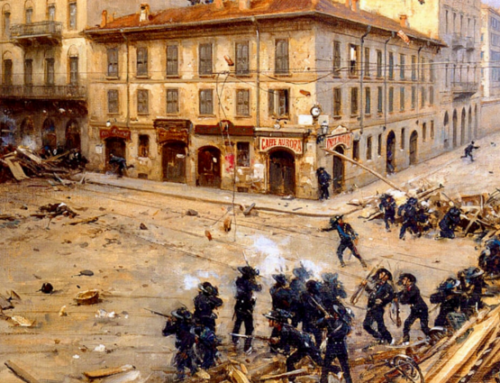President Trump’s promise to protect the American economy through the implementation of protectionist principles with regard to trade is nothing less than an extension of his desire to protect America’s sovereignty…
“Protection will lead to great prosperity and strength.” —Donald Trump (Inaugural Address)
 The world is full of ironies… and the world of politics especially. It was, for instance, ironic that those who rioted at President Trump’s inauguration, blinded by pride, prejudice and propaganda, had not apparently realized that they were rioting against the only president in God-knows-how-many-years who was actually agreeing with them on the evils of globalization and was planning to do something about it.
The world is full of ironies… and the world of politics especially. It was, for instance, ironic that those who rioted at President Trump’s inauguration, blinded by pride, prejudice and propaganda, had not apparently realized that they were rioting against the only president in God-knows-how-many-years who was actually agreeing with them on the evils of globalization and was planning to do something about it.
The people who were smashing the windows of the local Starbucks and McDonalds in D.C. as a protest against “capitalism” are the same people, in creed if not necessarily in person, as those who riot at G20 Summits around the world demanding an end to the evils of globalization. Why, one wonders, did they not riot at President Obama’s inauguration, a president who wholeheartedly supported and endorsed globalization, reserving their wrath instead for his anti-globalist successor? The answer is, of course, the ignorance and arrogance of an urbanized youth culture which has bought into all the cultural and ideological byproducts of globalism, such as hedonism and its Frankenstein child, the Pride movement. Claiming to oppose globalism for its injustice to the poor, these misguided youths nonetheless practice the godless humanism and lifestyle choices that globalism nurtures, including consumerism in the marketplace and Pride in the public square. It is indeed ironic that the laissez-faire economics that the rioters oppose is responsible for the laissez-faire morals that they espouse. They are children of the very monster they claim to oppose. They are good “global citizens” of the globalized world order, even if they think they are rebels.
Let’s leave the misbehaving children in the corporate nursery in which they were raised and return to the real world and it’s all-too-real problems. Let’s return, in fact, to President Trump’s inauguration and, more specifically to his inaugural address. This is what he says about tackling the economic imperialism of the globalists:
For many decades, we’ve enriched foreign industry at the expense of American industry; subsidized the armies of other countries while allowing for the very sad depletion of our military; we’ve defended other nation’s borders while refusing to defend our own; and spent trillions of dollars overseas while America’s infrastructure has fallen into disrepair and decay.
We’ve made other countries rich while the wealth, strength and confidence of our country has disappeared over the horizon. One by one, the factories shuttered and left our shores, with not even a thought about the millions upon millions of American workers left behind. The wealth of our middle class has been ripped from their homes and then redistributed across the entire world…. From this day forward, a new vision will govern our land…. Every decision on trade, on taxes, on immigration, on foreign affairs, will be made to benefit American workers and American families. We must protect our borders from the ravages of other countries making our products, stealing our companies and destroying our jobs. Protection will lead to great prosperity and strength.
These words are music to the ears for those of us who have long opposed the imposition of globalist imperialism, even those of us who have had difficulty endorsing candidate Trump for other reasons. At last, a major politician has had the courage and audacity to look the globalist tyrant in the eye. At last, a politician has had the courage to state what anyone with eyes can see, but to which politicians, such as Mr. Obama, the Clintons and the Bushes have chosen to turn a blind eye. At last, a politician has had the chutzpah to state the obvious, that global free trade is, in reality, the freedom of the most powerful corporations and financial institutions to move their wealth to wherever the costs of land, labour and capital are cheapest, at huge human cost to those workers left behind in the economic wasteland that such globalism leaves in its destructive wake. At last!
President Trump’s promise to protect the American economy through the implementation of protectionist principles with regard to trade is nothing less than an extension of his desire to protect America’s sovereignty. Protecting one’s borders does not simply mean tighter immigration controls along the Rio Grande; it means protecting the national economy from those corporate and financial vampires who have been sucking its lifeblood by draining its wealth and resources into China and the Pacific Rim. He is right to condemn the wanton and systematic sacrifice of America’s economic infrastructure on the altar of the freedoms demanded by members of an internationalist elite who seek to minimize the power of nations so that they can maximize their own wealth and influence in the absence of any restrictions on trade.
For those of us who have always advocated protectionism as the extension of the principle of subsidiarity into the arena of international trade, it comes as a relief that the word has returned to the lexicon so that we can use it in polite company. For years, amid the manic mantra of “free trade,” “protectionism” was a word that made one a pariah if one uttered it favourably in public discourse, much as words like “virtue” or “sin” make one a pariah in the public square today. As one who has always been happy to use the right word, even when it is considered an impolite word, I’ll state unequivocally that protectionism will help us towards a virtuous economy—i.e., one oriented towards the genuine freedom that comes with justice, and will help us resist the multifarious sins associated with the imposition of the globalist juggernaut.
Books by Joseph Pearce may be found in The Imaginative Conservative Bookstore.







“One by one, the factories shuttered and left our shores, with not even a thought about the millions upon millions of American workers left behind. ”
It’s funny but, just earlier this morning I was thinking of the old Archie Bunker show, aka “All In The Family” and how it represented, right there on the TV screen, the change in the democrat party at the time. For decades, the Archie Bunkers of the world had been the mainstay of the democrat party, working class, often union member folks who voted for Franklin Roosevelt in vast numbers and then Truman, Kennedy and Johnson. But by the early 70’s, they were becoming an embarrassment as the democrat party moved upscale and became more elitist, as represented by the other main character of the show, Mike (the Meathead) Stivik. And it’s continued right to the present. The whole “Occupy” thing wasn’t working class Archie Bunker types but rather upper middle class white college kids for whom protesting was a sort of lark. And it was the same for that idiotic protest the day after Donald Trump’s inauguration. Who were the leaders at this protest? Genuine working class folks? No. It was washed up ex-movie stars (Ashley Judd) and washed up ex-singing stars (Madonna), the former sounding like an escapee from a mental institution.
This is the key line in Trump’s speech: “Every decision on trade, on taxes, on immigration, on foreign affairs, will be made to benefit American workers and American families.”
That doesn’t necessarily call for the end of free trade agreements. Free trade can be beneficial and protectionism can be beneficial. It depends on the agreement. When tariffs are high then a break down of tariffs is economically sound policy, but there is a point of diminishing return. At some point the incentive becomes to move out of the country to a lower salaried work force. So some level of tariffs actually help a nation. The problem is knee-jerk free traders and knee-jerk protectionists. You have to find a sweet spot in between. So if you really think Trump is going to end free trade, I don’t think it will happen. Congress wouldn’t let him anyway.
Respectfully, I disagree with Mr. Pearce’s optimistic view of Trump’s policies. I believe President Trump is on the right track of focusing economics towards the national rather than the global. Along with Joseph Pearce, I applaud him for that. However, President Trump is still very far away from the Distributist principles I know Mr. Pearce espouses as well. Recently, the President has emphasized deregulation as a solution to our national economic sluggishness. Some of these regulations were safety nets for workers and for the environment. Under Trump’s economic policies, we are still in the realm of wage-slaves serving the businesses, rather than the businesses serving the greater and higher needs of the family and environment, both of which God has provided for us. I certainly hope that President Trump leads us further to that direction, but his words and actions thus far, as laudable of some of them may be, still pose impediments to Distributist principles.